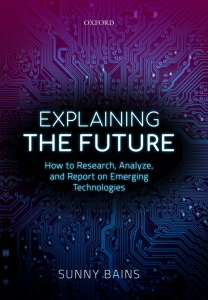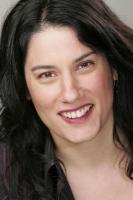
Sunny Bains: Explaining the Future
For this column, NASW book editor Lynne Lamberg asks NASW authors to tell how they came up with the idea for their book, developed a proposal, found an agent and publisher, funded and conducted research, and put the book together. She also asks what they wish they had known before they began working on their book, what they might do differently the next time, and what tips they can offer aspiring authors. She then edits the A part of that Q&A to produce the author reports you see here.
Publication of NASW members’ reports in Advance Copy does not constitute NASW’s endorsement of their books. NASW welcomes your comments and hopes this column stimulates productive discussions.
EXPLAINING THE FUTURE:
HOW TO RESEARCH, ANALYZE, AND REPORT
ON EMERGING TECHNOLOGIES
Sunny Bains
Oxford University Press, April 27, 2019 (US), $32.95
ISBN 10: 0198822820; ISBN-13: 9780198822820
Bains reports:
I’ve had bad experiences trying to write books. The first two were supposed to be co-authorships, but I didn’t have the right skill sets. For the third (on my own this time), I had an agent and an offer of a book deal, but we passed on that one waiting for another company to come in. The wrong version of the proposal was shown to the marketing committee and it all came to nothing. I gave up.
Then, I decided I would write a book on communication for my engineering students, as proper course notes. I decided to work on it in the background: if I got it finished I would look for a publisher. I never did. It wasn’t right.
Finally, I was gearing up to teach a new class on tech journalism and started to look for a text on technology analysis. There were none. All of a sudden, something clicked in my brain: the world didn’t need another book about writing (and certainly not one written by me!). What it did need was a book that taught all of the skills involved in science/tech journalism–research, analysis, and writing–in a way that showed the common philosophy between the three.The outline practically wrote itself after that, as did the first couple of chapters.
At this point I realized that–if I was ever going to finish–I needed a deadline (I’m a journalist after all!). So, I decided to see if any academic publishers were interested. I only had to contact two. First was the biggest: I contacted Oxford University Press through their website: I had no contact there at all. I also contacted MIT Press (the best for the kinds of technical books I read). Ironically, in that case, I did it through the kindness of one of the people who had been involved in my earlier failed book deal.
After that, it was straightforward: proposal, acceptance (both wanted it, hooray!), small advance, WORK, publication.
Totally worth the wait: already starting on the next one!
Contact info:
- Sunny Bains, sunny.bains@ucl.ac.uk, https://www.sunnybains.com/, https://www.explaining-the-future.org/, @techsunny
- Publicist: Damien Hughes, +44 1865 353387, damien.hughes@oup.com
NASW members: will your book be published soon? Take advantage of this opportunity for shameless self-promotion. Submit your report for Advance Copy.
Tell your fellow NASW members how you came up with the idea for your book, developed a proposal, found an agent and publisher, funded and conducted research, and put the book together. Include what you wish you had known before you began working on your book, or had done differently.
See https://www.nasw.org/advance-copy-submission-guidelines.
View Advance Copy archives at https://www.nasw.org/member-article/advance-copy.
Thinking of writing a book? If you are a NASW member, you may access a list of more than 150 books and online resources to help you craft your book proposal, find an agent and funding sources, negotiate your contract, learn about self-publishing, publicize and market your book, and more at https://www.nasw.org/article/write-book.
Send book info and questions about book publishing to Lynne Lamberg, NASW book editor, llamberg@nasw.org.
Image: Seattle Public Library by Esther Chilcutt from Pixabay.
Advance Copy
The path from idea to book may take myriad routes. The Advance Copy column, started in 2000 by NASW volunteer book editor Lynne Lamberg, features NASW authors telling the stories behind their books. Authors are asked to report how they got their idea, honed it into a proposal, found an agent and a publisher, funded and conducted their research, and organized their writing process. They also are asked to share what they wish they’d known when they started or would do differently next time, and what advice they can offer aspiring authors. Lamberg edits the authors’ answers to produce the Advance Copy reports.
NASW members: Will your book be published soon? Visit www.nasw.org/advance-copy-submission-guidelines for information on submitting your report.
Publication of NASW author reports in Advance Copy does not constitute NASW's endorsement of any publication or the ideas, values, or material contained within or espoused by authors or their books. We hope this column stimulates productive discussions on important topics now and in the future as both science and societies progress. We welcome your discussion in the comments section below.





